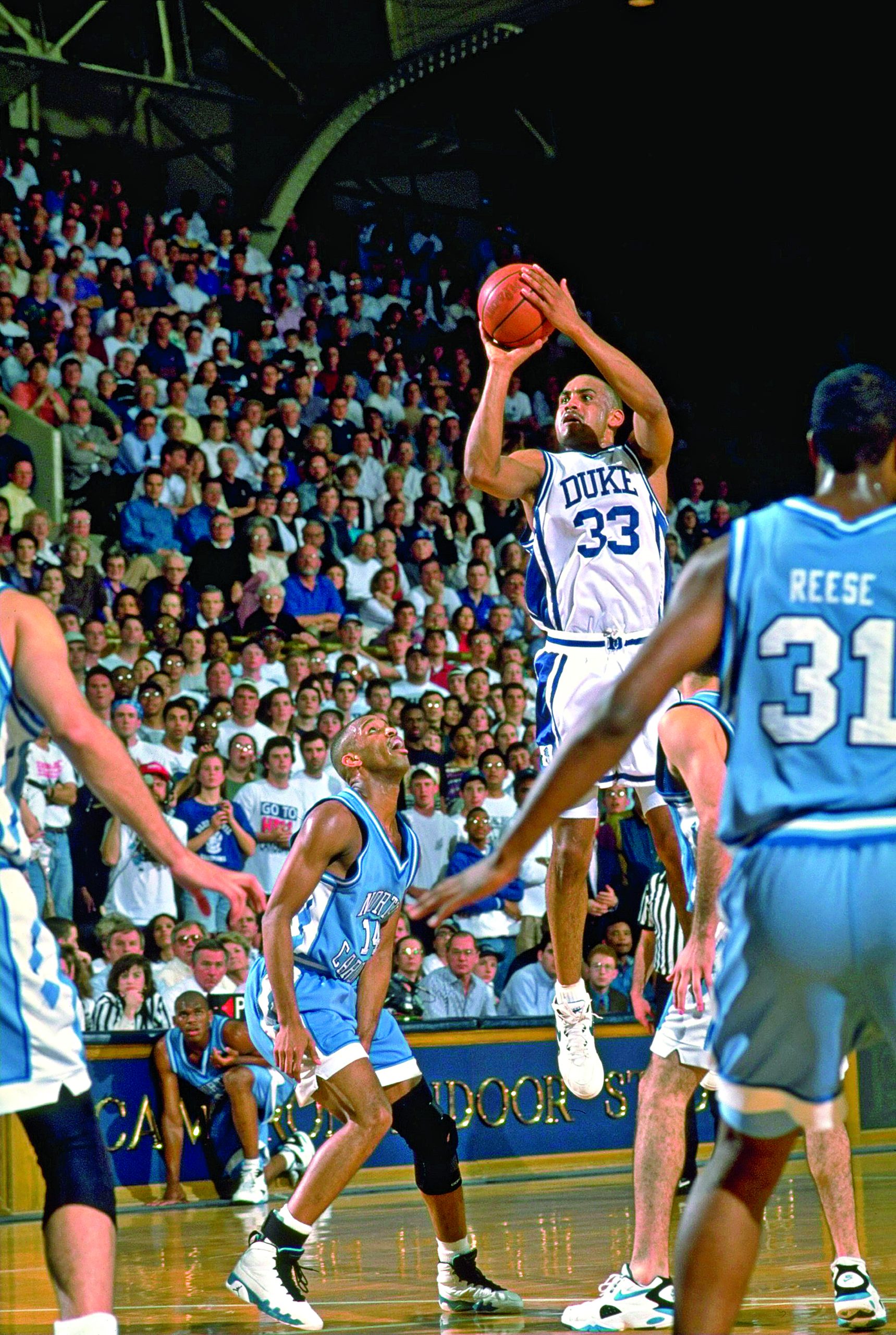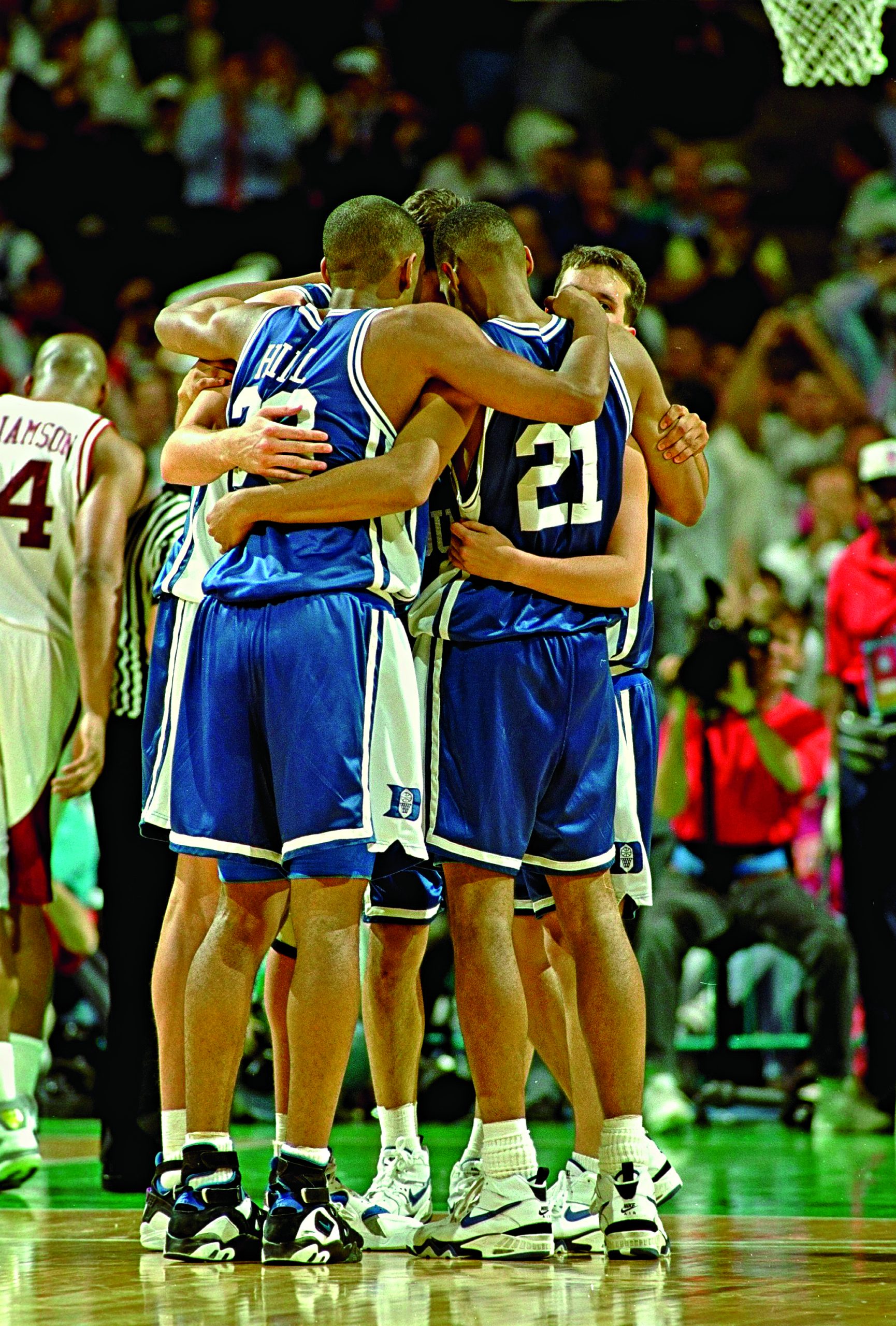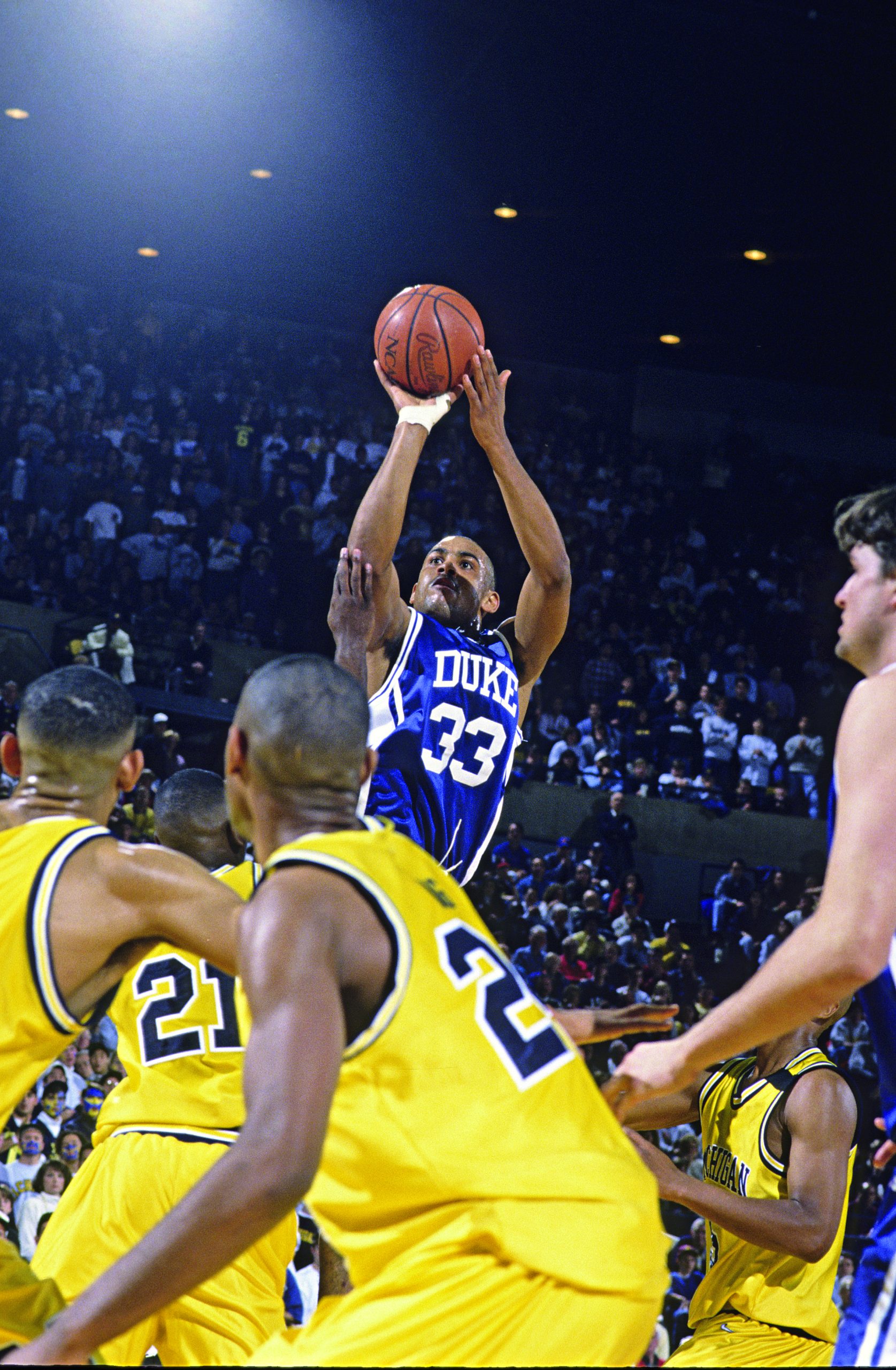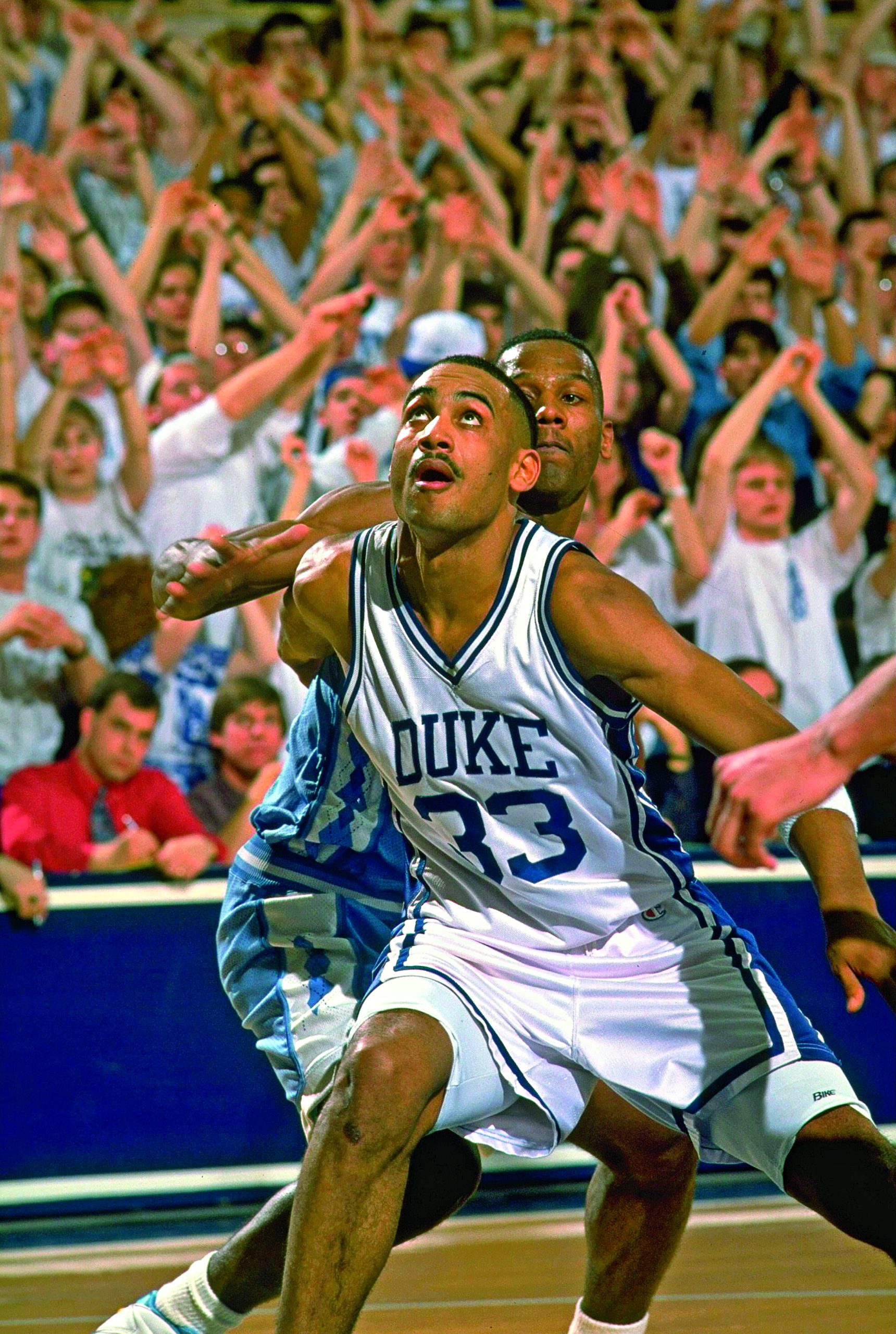Grant Hill and 9th Wonder have a Candid Conversation about Duke Basketball and its Relationship with the Black Community
For the past 30-plus years, I’ve had the chance to witness the remarkable career of Duke Men’s Basketball legend and basketball Hall of Famer Grant Hill. I’ve gone from being just a fan to a friend. We’ve talked many times about what it was like to be an African American student and athlete at Duke University, and recently I had the chance to ask him a few questions about the evolution of Duke Basketball, from a racial standpoint, and how basketball fans across the country and the world perceived Duke Basketball, then and now.
9TH WONDER: You know as well as I, and we’ve talked about this many times, but when people think of Duke—the campus, being on the Men’s Basketball team, even playing for Coach K—Black and Duke don’t go together, at least in the minds of many people. Did you feel that way before you got to Duke?
GRANT HILL: I understand—now—the sort of thought process behind that. And in large part, I had a similar relationship in the NBA in the 1980s [with] the two franchises that really kind of ushered the League into this new era, the Celtics and the Lakers. As a young Black boy, I gravitated to the Lakers. They were exciting, they were Showtime, you had the personality of Magic [Johnson], but they were Black. And Boston—Larry Bird, Kevin McHale, Danny Ainge—they were white. This was me as a young 10, 11, 12-year-old, not fully aware of some of the racial dynamics and history that existed in Boston at that time. I think I naturally gravitated toward a Laker team much like I gravitated toward the Georgetown Hoyas.
And so I understand, looking back at it now, how people perceived that, particularly while we were there. We didn’t have Larry Bird and Kevin McHale, but we had Christian Laettner and Bobby Hurley—Danny Ferry before that—and we had success. And so I think that helped shape a lot of people’s perceptions, particularly people in our community, about how they felt about Duke at that time. But, also, I don’t know if I was fully aware of what those perceptions were, and I think we were insulated. We’re in a world now where everything’s at our fingertips. There’s technology, there’s social media, fans. Anyone and everyone has an opinion. Back then it was the Durham Herald-Sun and USA Today. And then, within the community of Durham, which as you know has a strong African American population and history, I, along with my other Black teammates, always felt that love, or at least love and respect. It’s difficult, because [North] Carolina, the rivalry makes it interesting. But I think even people who were maybe Carolina fans were always like, Yo, I rock with you, or, I don’t like Duke, but I love the way you play. So I felt that rivalry, but I never felt that deeper sort of angst within our community toward Duke and the Duke Basketball program.

So part of that is, look, the five schools that I looked at, three of them were state schools: North Carolina, Virginia, Michigan. And then two were small private schools, Duke and Georgetown. And the reality is, Georgetown’s very similar to Duke. But the perception about Georgetown was very different, in part because they had an all-Black basketball team and a very strong Black leader as a coach. But the schools themselves were very similar—they all were predominantly white institutions. So I always kind of looked at things through that lens. There may have been more Black students at Carolina or at Virginia or at Michigan, but the schools were bigger, and so naturally they were going to have more of us. But I think the percentage of Black students was probably very similar to Duke and Georgetown at those other schools. I feel like we weren’t fully aware of those perceptions that were out there at that time.
9TH: So probably the two most polarizing figures around that time, when it comes to [the perception by some of Duke] being non-Black or being against Black people or being anti-Black, or anything dealing with Black and basketball, are Coach K and Christian Laettner. And they were the two quote-unquote “symbolic” reasons why I, as a Black man, should hate Duke. But what people don’t realize is Coach K’s from Chicago, and although Chicago has diverse places and not-so-diverse places, it’s never been on the record that he’s been against African Americans or anything like that.
And even when we talk about Christian Laettner, he loved hip-hop. Not to say that makes him Black, but he loved hip-hop. So in that insulated blanket that you guys were in, did you ever feel—from your teammates or the program itself—any type of racial tension? Did you feel any different being a Black player for Coach K? Like, Well, he does this for the white boys on the team, or anything like that?
GH: No, no, I didn’t. And Christian, when I arrived, was—look, let’s face it, Christian was one of the great college basketball players of the modern era. You go from 1980 onward, there’s not someone who’s as accomplished, who had as much success, and Christian was dominant. And so there was a respect for that and an understanding that he was our horse. It was interesting, you talk about Christian, Christian not only loved hip-hop, but I think he really respected and took the time to try to understand Black culture.
And I think it’s maybe more accepted now in some ways, but back then, that was—you’re talking about a southern school in 1990! And so the perception…obviously the I Hate Christian Laettner documentary, I think, dispelled a lot of perceived myths of him at the time. But yeah, we were just trying to win. And ultimately, it was like, What’s going to give us the best opportunity to be successful? We needed Christian to be great. We needed Bobby [Hurley] to become the player that we knew he could be. I needed to do what I did. So there were obviously issues of race on campus. I remember when I first arrived around this time, 32 years ago, [Republican] Jesse Helms was running against [Democrat] Harvey Gantt.
9TH: I remember that.
GH: In the state of North Carolina! And there were a lot of people, a lot of students, who opposed Jesse Helms. A lot of Duke students, Black and white. And I mentioned that in my book, but I say that in part to represent that there were matters and issues of race that emerged on campus, and I’m sure emerged at a lot of campuses. Do we have enough African American faculty members? Just things of that nature that were indicative of the times.

But in terms of Duke basketball…I don’t know. Like I said, I was oblivious to it. And I joke, and this is maybe simplifying things, but everywhere we went, we were hated. And any time a team came to Cameron, they were hated. And you just thought that was ACC basketball. You thought that was also a byproduct of us being really good. And even when we played non-conference teams, they wanted to play us. They wanted to boo us. They wanted to beat us. And the crazy thing on that front is when you went to a lot of these games, a lot of times you looked in the crowd, and in the students’ section it was predominantly white. You know what I’m saying? You go to Florida State, you go to Clemson, you go to Carolina, you go to NC State, you look in the crowd, and I’d say 90 percent, 95 percent of the student population was white. So I just thought that was [because] we were good. People wanted to beat us. And when [opposing teams] came into Cameron, the Cameron Crazies, they dished it out, too. And so I just thought that was part of intercollegiate sports at that time. I really did. I understand now, but at the time, I was a little bit oblivious to all of that. Not a little bit—I was very much oblivious to all of that.
9TH: If Duke was like that in 1990, do you feel as if, over the years, it has gotten Blacker? The basketball team?
GH: Well, I think part of what played into this feeling was that Duke Basketball, from ’85, ’86, when that team emerged, really until present day, has been good. And particularly ’86 to maybe the mid-2000s, we seemed to have a steady stream of really good white basketball players who were like, Player of the Year [level], and were cocky. And you had a Danny Ferry, you had a Bobby, you had a Christian, you had a JJ Redick. You had guys that didn’t mind playing the role of villain, and I’m sure that rubbed people the wrong way. And like I said, played into this narrative. [But] I’ll say this, and I don’t know if people fully understand this, but when I was at Duke, those three years that we recruited, we tried to get guys.
9TH: Y’all tried to get Chris Webber.
GH: Jerry Stackhouse came on a visit. He obviously chose to go to North Carolina and had a great career at Carolina and a great pro career. We brought in Chris Webber on a visit. He chose to go to Michigan, had a Hall of Fame career. And there are other guys as well. So it wasn’t like we weren’t trying to recruit certain guys. We were trying to win. And I think it’s just, not all those guys necessarily wanted to come to Duke, for whatever reason. And we missed out on white guys, too. But I think this idea that Coach or the program only exclusively went after good white players or good guys or guys who fit a certain mold, I think that was inaccurate. I was there. I housed those guys. I mean, I used to entertain Stackhouse. When Chris Webber came, we threw a party trying to…we understood how good he was, and guys chose to go elsewhere.
And so I think as Coach K [increased] his success and stature…and I think the Olympic team and getting validation from those pros, I think a number of things may have played into where now we field teams [where] we’re all Black, or at least predominantly Black. So it’s almost ironic, the irony and all. It’s like the so-called perception of Duke Basketball and how that’s changed, particularly in the last decade. But look, Coach K…you know Coach K as well as anyone. All he wants to do is win.
9TH: That’s it.
GH: And he wants to get the best players that give him an opportunity to win. And that was up until this last year [when he retired], and that was certainly back in 1990 when I first arrived
on campus.

Oh, one other thing. I do think the fact that we played and we beat two very significant teams, UNLV, who was dominant, and then Michigan, and sort of what they represented culturally, and we beat both [of] those teams—I think that also played into people’s feelings about us. And, of course, our star guy was Christian Laettner, and we had a Bobby Hurley and then Coach K, and we were categorized as good versus bad. And I think the media did that.
9TH: What was the soundtrack of the locker room while you were there?
GH: That’s a good question. I don’t know. I think it changed every year because music was changing. So it was really kind of whatever was in. I think Poor Righteous Teachers, Jungle Brothers, LL Cool J. NWA’s second album. I’m trying to think what else. I remember my third year, that was The Chronic, that was a big album. And I also remember Geto Boys. That was big. [A] Tribe [Called Quest]. Oh Tribe! My second year, ’92, Tribe. And then my senior year, it was Cube, it was Wu-Tang. It was hip-hop. I mean, I knew about the Red Hot Chili Peppers, but that wasn’t in the locker room, that was just more in the school.
But yeah, it was very much hip-hop. It was embraced socially on campus with the non-Black students, which obviously is the same as I would assume it is now, the present day.
9TH: And it’s crazy because the time you played at Duke, ’91-94, if you place the the rap albums that came out those three years, it is insane. And movies, too. I’ve talked to a lot of guys who went to school with you, and a lot of white guys, and they say, I was here when Grant was here.
And I was like, What was your music of choice? They were like, Nas. And I was like…[Wow]. And this is a guy our age, corporate, and he loves Nas and Wu-Tang. So it’s funny to say this out loud, but you played at Duke during the golden era, during the golden era of hip-hop. It’s incredible to say out loud.
GH: Durham always gave us love, man. Anyway, I just think it’s important. I think you understand the city there, but we’d go off campus, we were out and about. People showed a lot of love. So I’m looking at Duke’s perception in the Black community through the lens of the residents of Durham. And so if we were in the West End, or if we were at McDougald or whatever, we were out and about like that. It was always love. Now, maybe the love was like, Yo, the Duke basketball players, they’re coming over and they’re spending time, they’re doing things, they’re hanging out, whatever it is. And ironically—well, I can’t say this with absolute certainty, but DC loved Duke.
9TH: Wow.
GH: Now if I say that, people may hate on me for saying it, but think about it. Coach K helped build some of his foundation by going up to the DMV.
9TH: Yes, absolutely. He did.
GH: Know what I mean? He got a lot of people out of the area. And so because of that, there was a lot of love. When I went home, people used to rock with Duke.
9TH: Wow, I never thought of that. That’s an interesting dynamic.
GH: Yeah. So I’m looking at it through that lens. All I know is the DMV, and I know Durham. I’m not going to these other places. And so I didn’t realize it until I left school and I got into the League and I started to understand how people perceived us. But look, the foundation, you got Johnny [Dawkins]—no disrespect to David Henderson, Mark Alarie, those guys, they were just as important. [But] you get your backcourt from DC. Then you come back, you get Billy King. Then you get the Player of the Year, Danny Ferry. That got it rolling.

It’s just interesting. I don’t feel like the Black community looks at Duke Basketball the same as they did 30 years ago.
9TH: No, not at all. It is ever-changing. It’s always transforming, all the time. And they don’t look at it the same. It’s a respect factor. It’s still I don’t like Duke, or whatever, but it’s a respect factor. It’s the “Duke Starting 5 Haircut” the 2015 national championship team had.
And on top of that, we have to understand that this generation of Black kids, they don’t really remember the Laettner years. A lot of these kids, their memory [goes back to] Kyrie Irving. And that’s the beginning. And if they’re looking at TV for the last 10 years, 12 years, all they see is all of these Black players. So if you’re a kid watching ball for the last 12 years, you don’t see Duke through the same lens as people saw Duke in 1991.
And I think that’s a beautiful thing.
Photos via Getty Images